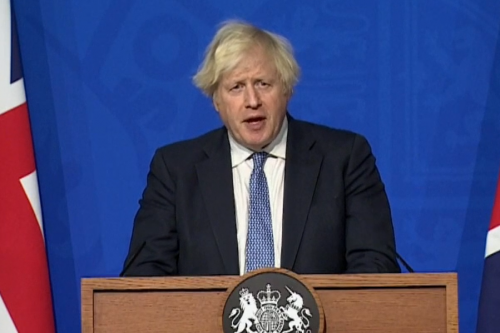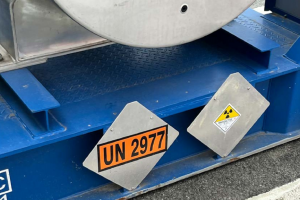‘Work from home from Monday’ as Omicron worries accelerate

Prime Minister Boris Johnson has asked everyone to work from home where possible once more as concern about the acceleration of the Omicron variant increases.
The Government has brought in “Plan B” to try and address the rising case numbers, with Johnson saying it was now the “proportionate and responsible thing” to do.
Johnson, speaking at a teatime press conference, said there is evidence that the doubling time of Omicron in the UK could currently be between two and three days.
“We will reintroduce the guidance to work from home,” said Johnson. “Employers should use the rest of the week to discuss working arrangements with employees. From Monday, you should work from home if you can.”
Two measures will come into force in a week’s time.
It will be a legal requirement to wear a facemask to theatres and cinemas and the NHS pass – which currently requires two vaccines – will be made mandatory for nightclubs and other venues.
From this Friday the legal requirement to wear face masks will be extended to most public indoor venues, including theatres and cinemas, but with exemptions, such as “when eating, drinking, exercising, singing”.
The Government will make the NHS Covid pass mandatory for nightclubs and large venues, which includes unseated indoor venues with more than 500 people, seated outdoor venues with more than 4,000 people, and any venue with more than 10,000 people.
Johnson said: “We will give businesses a week’s notice so this will come into force in a week’s time, helping to keep these events and venues open at full capacity, while giving everyone who attends the confidence that those around them have done the responsible thing to minimise risk to others.”
The Prime Minister added the Government “will be guided by the hard medical data around four key criteria” – the efficacy of vaccines and boosters, the severity of Omicron, the speed of its spread, and the rate of hospitalisations.
The Government is under huge pressure because of parties held in Downing Street which today led to the resignation of Allegra Stratton, who was shown in a leaked video laughing about one event last December.
The Government’s chief scientific adviser Sir Patrick Vallance, who was alongside the Prime Minister, said: “The measures work when people follow them and that’s been shown time and time again.
“It’s incredibly important everyone follows it. That’s everybody. It’s was incredibly important throughout, it’s going to be incredibly important going forward – and it only works if we all do it.”
The announcement was greeted with widespread disappointment by many in the region’s business and hospitality sectors.
Bill Addy, CEO of Liverpool BID Company and Chair of Liverpool Visitor Economy Network, said: “We await clarity on exactly what this proof of COVID status will involve. We are working with venues and organisations across retail, hospitality, culture and the wider Liverpool Visitor Economy to ensure they have clear guidance for both their staff, customers, visitors and audience. This is a huge, logistical challenge for organisations and we would ask for everyone’s patience.

Bill Addy
“As businesses shift to working from home guidance and those affected absorb the impact of new restrictions, we once again have to point out to this Government that it is those industries who have borne the brunt of restrictions over the past 18 months who are being asked to do so again.
“Christmas is a crucial time for organisations within the city as people visit theatres, music venues, concerts and more. Culture, arts and entertainment lost 20% of its sector GVA due to COVID restrictions, with Merseyside one of the worst regions affected. This sector is a major employer in our city and a loss of income affects jobs, venues and risks us starting 2022 a step behind. These venues being forced to change their guidance to audiences deserve support for any loss of income.”
Liverpool Chamber chief executive, Paul Cherpeau, called on the Government to provide more support for businesses.
He says the introduction of mandatory face coverings in indoor settings, vaccination passports for larger venues and advice to work from home where possible will have a cumulative negative effect on businesses in a range of sectors.
“The move to so-called Plan B restrictions to tackle the Omicron variant will leave many businesses fearing the worst over what would otherwise be a busy and profitable Christmas period. While they will naturally want to protect their customers, operators in the city region’s tourism, hospitality and retail sectors will once again be amongst those feeling the tightest financial squeeze.
“More people working from home means lower footfall for cafes, restaurants and retailers, while some customers have already chosen to cancel Christmas parties and other events. This clearly reduces businesses’ ability to make money, pay staff and meet their bills and it also has a knock-on effect along the supply chain, ultimately hurting confidence across the regional economy.”
He added: “Many businesses have innovated to adapt to new ways of working, but the updated rules around masks and vaccination passports will still add a further layer of bureaucracy for owners and employees. Many firms will not be able to simply absorb those burdens of cost and time, especially if their customer levels and income are dented by customers staying away, so they need to know they will be supported as they observe the new rules.
“The Government needs to provide a clear model of financial support that will be made available to businesses and staff as these latest measures – and any future tightening – begin to bite. Without state support, some firms will not survive the winter, so we urge the Government to give businesses greater confidence and reduce the concerns of those that have already been hit so hard by the pandemic.”
Michael Kill, CEO of the Night Time Industries Association, which includes Greater Manchester night time economy adviser Sacha Lord in its membership, said: “Today’s announcement of Plan B by the Government is devastating news for nightlife sector.

Michael Kill
“Vaccine passports have a damaging impact on night time economy businesses, as we have seen in other parts of the UK where they have been implemented like Scotland – where trade is down 30% – and Wales, where it down 26%.
The UK Government have twice ruled out vaccine passports before twice changing their mind. The mixed public health messages this week that have been coming out of the Government have arrived at the worst possible time – the pre-Christmas period is absolutely crucial for our sector.
“And now it is announced damaging vaccine passports are to be implemented. Far from ‘saving’ Christmas, the Prime Minister has given our sector the horrible present of more pain for businesses desperately trying to recoup losses from earlier in the pandemic. The fact that businesses have only been given one week to make such an enormous change to their operating model is an additional insult.”
He said: “The Government’s own report on the subject concluded that vaccine passports wouldn’t even have a significant impact on virus transmission – they don’t stop the spread of COVID but they do damage trade. You do, therefore, have to question the timing and rationale for this announcement.
“Is this sound evidence-based public policy making, or is this an attempt to move the news agenda on from a damaging story about the Downing St Christmas party? It feels that nightclubs and bars have been thrown under the bus by the Prime Minister for him to save his own skin.
“And, of course, these businesses, who have already sacrificed so much during the pandemic, will be asking – ‘why are we being asked to carry more of the burden when it seemed that the most senior government officials felt they didn’t need to do their bit?’”
Matthew Fell, CBI chief policy director, said: “Fresh restrictions are a big setback for businesses, particularly for those in hospitality and retail who are in a critical trading period, as well as others such as transport.
“While COVID certification can support public health, careful implementation and enforcement will be required to assist businesses affected.
“It will be vital that the impact of these restrictions is closely monitored, and that the Government is ready with targeted support as required.
“Omicron will, quite likely, not be the last variant. We need to create consistency in our approach and build confidence by reducing the oscillation between normal life and restrictions. Prioritising daily testing, rather than self-isolation, is a good step. Firms need continued forward guidance and a commitment from government to prioritise ongoing free, mass rapid testing as we learn to live with the virus.
“Meanwhile, firms will continue to do all they can to protect their staff and customers, including being as flexible as possible to enable employees to get their boosters.”








